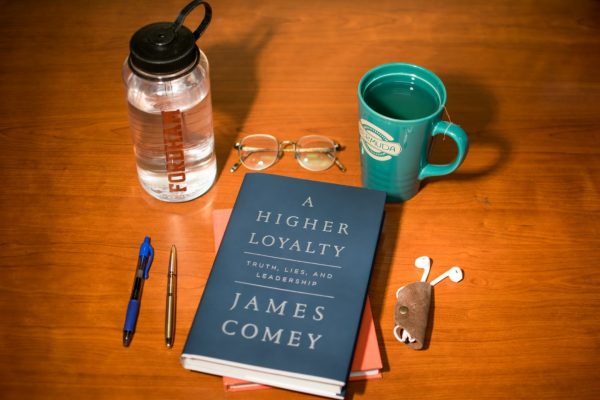Controversy and Coffee At Comey’s Book Tour
James Comey’s new book reflects on his years as the director of the FBI. (ANDREW BEECHER/THE OBSERVER)
May 7, 2018
It is unusual for most people’s Wednesday mornings to include an hour wait on a windy cross street; however, on April 18, hundreds lined the blocks around Barnes & Noble Union Square to purchase a copy of James Comey’s new book, “A Higher Loyalty: Truth, Lies, and Leadership.” At stake was the potential to get a signed copy and wristband to attend a talkback later in the evening. Lucky for me, I got both.
When I returned to Barnes & Noble that evening to reserve a good seat for Comey’s appearance, it was apparent that the book drew polarizing reactions. In the morning, I saw people eagerly lining up to purchase his book. Hours later, police barricades fenced off the sidewalks outside the front of the store and protesters gathered outside, clutching signs that read “Jail Comey” and “Corrupt Comey.”
Inside, the audience both heard and produced audible gasps when, at the stroke of seven, they spotted the 6-foot-8 man making his way to the stage. Comey had stated before that he did not want a commercialized book tour, and even refused to sign copies of his book up until two days prior to its release. Yet, he paraded his way through the obligatory press photos and waited for his cue to go on stage, all while an ocean of iPhones and selfie sticks floated above the audience.
One of the first things Comey said was that “when you suffer loss, your obligation is to try and make something good come from it.” This was the overarching theme of his discussion and the premise of his book, which he described as trying to be both — and at the same time, neither — a leadership book and a memoir. Comey noted that today, “we don’t have a good picture of what ethical leadership can be and should be.” In today’s world, he added, “we care about the rule of law.” It is this commonality that unites us all.
Through a series of personal stories, the book focuses on what it means to be an ethical leader on both a personal and national level. With previous presidents such as George W. Bush and Barack Obama, Comey stated that they were held accountable to what they promised, and the public “tethered them to that.” Currently with President Trump, however, Comey spotted a clear distinction in the lack of responsibility entrusted to the president. He compared and contrasted the actions of the former presidents with the current, and the public’s reactions to them.
Comey hit well with audience members through touches of humor. He detailed small moments like President Obama’s poker face and what actors his children would choose to play him in a biopic, which he was vehemently against. At other times, audience members were impressed with his unaffected nature reacting to hecklers during his Q&A. While the talkback focused on the purpose of the book, he also mentioned some of his own insecurities, including controlling his ego and the negative reputation that he thinks he has personally made for the FBI.
Critics recognize that Trump’s occupancy in the novel holds bias, including a detailed description of his physical appearance, and is said to hurt Comey’s reputable image. Although Comey has faced widespread criticism on his book, President Trump is only mentioned in three of the 14 chapters. Nonetheless, Comey’s confidence, humility and humor delineates from the typical memoir and creates a dialogue for reevaluating the current leadership, prompting us to ask ourselves what it means to be an ethical leader. Comey closed with a cry to the people: “Do not withdraw. Do not become disenchanted.”











